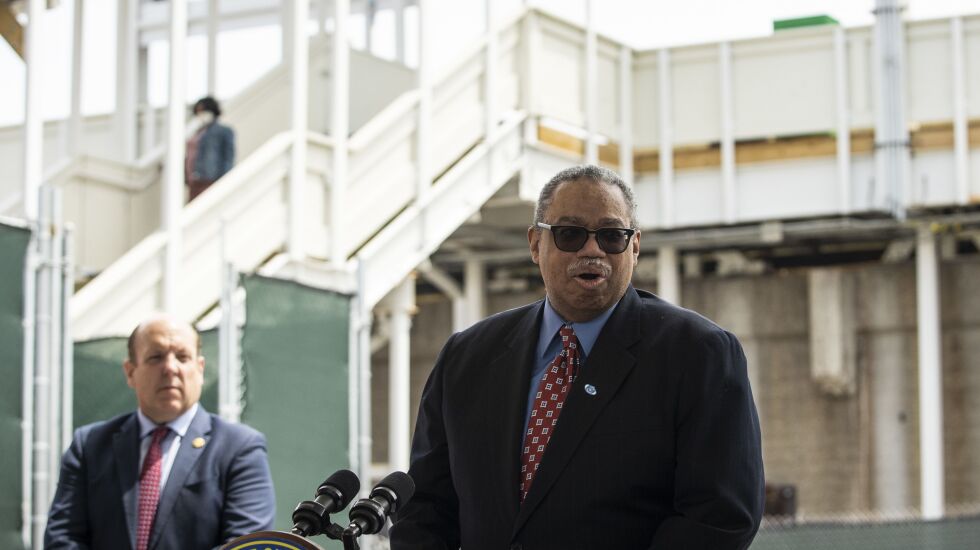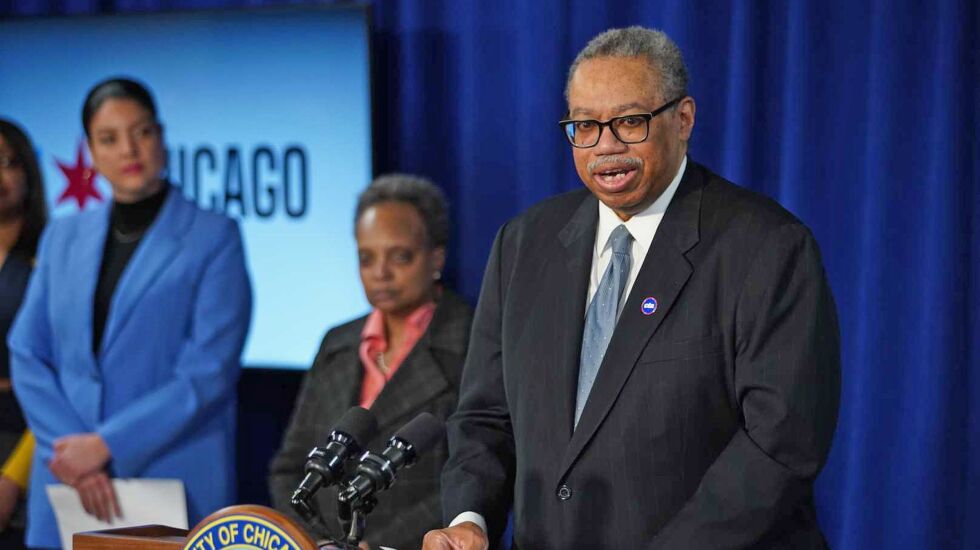
Embattled CTA President Dorval Carter Jr. may soon be compelled to make quarterly appearances before a City Council he has chosen to ignore — or risk losing city funding he needs to expand the mass transit system and maintain existing service.
Tired of being ignored, North Side Ald. Andre Vasquez (40th) is introducing an ordinance at Wednesday’s City Council meeting that would literally force Carter and his executive team to appear before the City Council’s Transportation Committee every three months to answer questions about crime, hiring shortages and scheduling discrepancies.
The Transportation Committee “shall hold at least one hearing each quarter regarding service levels, operations and security” of the CTA where “the president of the CTA shall testify if requested by the chair,” the ordinance states.
“No member of the City Council or other municipal officer shall introduce — and no committee of the City Council shall consider or recommend — any intergovernmental agreement with the CTA or other ordinance or order that disburses funds to the CTA in the succeeding quarter if the president and officials do not participate in any scheduled hearing.”
The only exception would be when “disbursement of such funds are required by state law.”
Vasquez already has 24 co-sponsors. That’s how furious members are about being dissed by the former federal bureaucrat appointed by former Mayor Rahm Emanuel and retained by Mayor Lori Lightfoot.
“There’s definitely a problem when you’ve got a CTA president who, in the times that we’re going through right now, doesn’t show up to Council meetings. They just need to show up,” Vasquez told the Sun-Times.
“Nobody’s imagining that this problem is gonna get solved at the snap of a finger. But at the very least, when we’re talking about taxpayer dollars being put towards improving a public transportation system, a president who’s being paid by those dollars should have the decency to show up. … At bare minimum, you show up to tell us what’s going on.”
Lightfoot is introducing her own ordinance at Wednesday’s Council meeting. It would renew the intergovernmental agreement between the city and the CTA. The agreement annually funnels $3 million in motor fuel tax revenues to the mass transit agency.
That’s normally as routine as it gets — but it won’t be routine if Vasquez gets his way.
“Mayor Lightfoot should be equally concerned that the CTA president does not appear when we have concerns about reliability, when we see people waiting 45 minutes for buses or trains, when people are concerned about the safety of the CTA,” Vasquez said.

Asked for comment, CTA spokesperson Brian Steele responded with a statement.
The agency “has and continues to work with, and have an open dialogue with, the City Council on a wide variety of issues related to transit service,” Steele said.
“We continue that commitment, and continue to make improvements as outlined in our ... comprehensive plan to strengthen the foundations of the rider experience – more consistent and reliable service, safe rides, clean facilities, modern amenities, dynamic customer engagement tools, and a strong CTA workforce.”
The Vasquez ordinance could complicate Lightfoot’s push for a City Council vote by Dec. 31 on her controversial plan to create a new tax increment financing district to bankroll $950 million (about 26%) of the $3.6 billion cost of extending the CTA’s Red Line from 95th Street to 130th Street and building four new stations along the 5.6-mile route.
Earlier this month, Planning and Development Commissioner Maurice Cox got an earful about that plan — though the real target was Carter.
Downtown Ald. Brendan Reilly (42nd) argued that day that Carter “needs to come in and be held to account” by a City Council he has repeatedly ignored.
Ald. Scott Waguespack (32nd), Lightfoot’s hand-picked chair of the City Council’s Finance Committee, asked Cox what he planned to do to get Carter to “listen to the City Council if we’re gonna dole out potentially $1 billion.”
He added: “What are we gonna get out of this? Because it’s been … for decades, sort of a back hand to the City Council when they’re asking for funds to be utilized through the City Council,” Waguespack said then.
The CTA has been inundated with complaints lately about unreliable service after some commuters have been left waiting at bus stops and train stations for extended periods.
One coalition of riders even went so far as to compare actual arrivals against the CTA’s posted Blue Line schedule. Buses and trains that show up on CTA trackers — but never actually arrive when the tracker indicates they should or did — have been branded “ghosts.”
Twice over the last two months, the CTA has adjusted its rail schedules to better fit with its current workforce in hopes of addressing those concerns.
The latest weekday and weekend schedules took effect Sunday with the goal of providing “consistent and more reliable service” at a time when ridership remains 500,000 passengers-a-day below pre-pandemic levels.
“This is just a start. We recognize there is more work to do. But, we are moving in the right direction and will continue to make additional adjustments to further improve service reliability and consistency,” Carter was quoted as saying in a statement.







